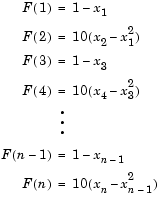

| Optimization Toolbox |   |
Nonlinear Equations with Analytic Jacobian
This example demonstrates the use of the default medium-scale fsolve algorithm. It is intended for problems where
 such that
such that  .
.
The example uses fsolve to obtain the minimum of the banana (or Rosenbrock) function by deriving and then solving an equivalent system of nonlinear equations. The Rosenbrock function, which has a minimum at  , is a common test problem in optimization. It has a high degree of nonlinearity and converges extremely slowly if you try to use steepest descent type methods. It is given by
, is a common test problem in optimization. It has a high degree of nonlinearity and converges extremely slowly if you try to use steepest descent type methods. It is given by

First generalize this function to an n-dimensional function, for any positive, even value of n:

This function is referred to as the generalized Rosenbrock function. It consists of n squared terms involving n unknowns.
Before you can use fsolve to find the values of  such that
such that  , i.e., obtain the minimum of the generalized Rosenbrock function, you must rewrite the function as the following equivalent system of nonlinear equations:
, i.e., obtain the minimum of the generalized Rosenbrock function, you must rewrite the function as the following equivalent system of nonlinear equations:

This system is square, and you can use fsolve to solve it. As the example demonstrates, this system has a unique solution given by  .
.
Step 1: Write an M-file bananaobj.m to compute the objective function values and the Jacobian.
function [F,J] = bananaobj(x); % Evaluate the vector function and the Jacobian matrix for % the system of nonlinear equations derived from the general % n-dimensional Rosenbrock function. % Get the problem size n = length(x); if n == 0, error('Input vector, x, is empty.'); end if mod(n,2) ~= 0, error('Input vector, x, must have an even number of components.'); end % Evaluate the vector function odds = 1:2:n; evens = 2:2:n; F = zeros(n,1); F(odds,1) = 1-x(odds); F(evens,1) = 10.*(x(evens)-x(odds).^2); % Evaluate the Jacobian matrix if nargout > 1 if nargout > 1 c = -ones(n/2,1); C = sparse(odds,odds,c,n,n); d = 10*ones(n/2,1); D = sparse(evens,evens,d,n,n); e = -20.*x(odds); E = sparse(evens,odds,e,n,n); J = C + D + E; end
Step 2: Call the solve routine for the system of equations.
n = 64; x0(1:n,1) = -1.9; x0(2:2:n,1) = 2; options=optimset('Display','iter','Jacobian','on'); [x,F,exitflag,output,JAC] = fsolve(@bananaobj,x0,options);
Use the starting point  for the odd indices, and
for the odd indices, and  for the even indices. Accept the
for the even indices. Accept the fsolve default 'off' for the LargeScale parameter, and the default medium-scale nonlinear equation algorithm 'dogleg'. Then set Jacobian to 'on' to use the Jacobian defined in bananaobj.m . The fsolve function generates the following output:
Norm of First-order Trust-region Iteration Func-count f(x) step optimality radius 0 1 4281.92 615 1 1 2 1546.86 1 329 1 2 3 112.552 2.5 34.8 2.5 3 4 106.24 6.25 34.1 6.25 4 5 106.24 6.25 34.1 6.25 5 6 51.3854 1.5625 6.39 1.56 6 7 51.3854 3.90625 6.39 3.91 7 8 43.8722 0.976562 2.19 0.977 8 9 37.0713 2.44141 6.27 2.44 9 10 37.0713 2.44141 6.27 2.44 10 11 26.2485 0.610352 1.52 0.61 11 12 20.6649 1.52588 4.63 1.53 12 13 17.2558 1.52588 6.97 1.53 13 14 8.48582 1.52588 4.69 1.53 14 15 4.08398 1.52588 3.77 1.53 15 16 1.77589 1.52588 3.56 1.53 16 17 0.692381 1.52588 3.31 1.53 17 18 0.109777 1.16206 1.66 1.53 18 19 0 0.0468565 0 1.53 Optimization terminated successfully: First-order optimality is less than options.TolFun
 | Additional Arguments: Avoiding Global Variables | Nonlinear Equations with Finite-Difference Jacobian |  |